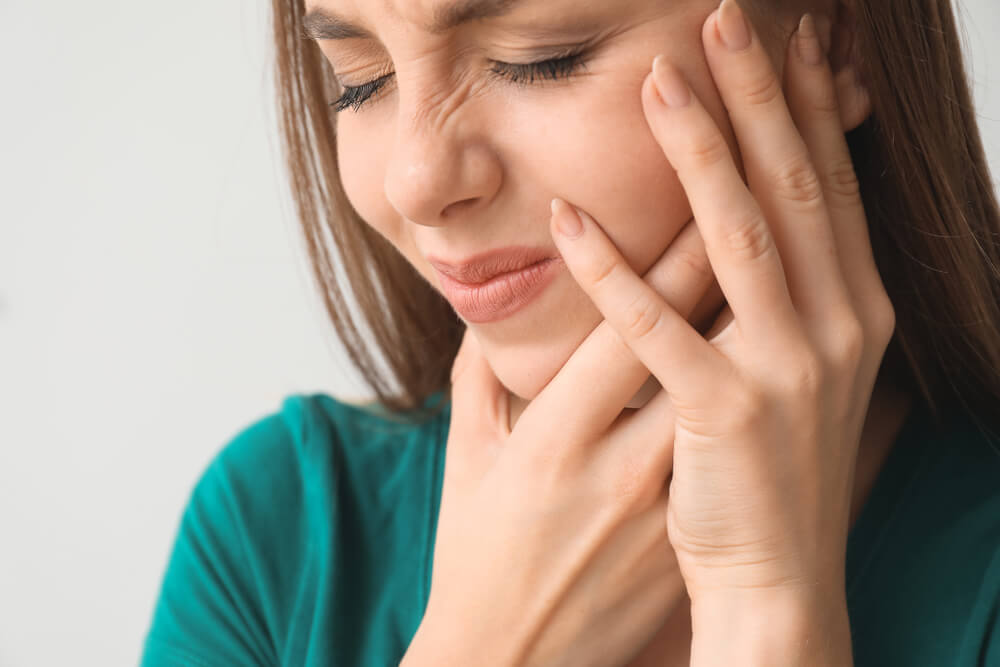What Causes Orofacial Pain?

Because orofacial pain can have so many different causes, it can be very challenging to pinpoint exactly where the trouble lies.
There are, however, some common culprits that can cause severe orofacial pain. Luckily, we can treat most of them. Since there can be so many different reasons for suffering from orofacial pain, we recommend a collaborative approach to diagnosing the cause, working with other medical professionals as well as our dental team. Let’s take a look at some of the more common causes of orofacial pain.
Periodontal Diseases
Periodontal disease can be a serious condition, resulting in pain in the face, jaw, and teeth. It usually occurs after gingivitis is left untreated. There are a number of risk factors for periodontal disease, including genetics and poor oral hygiene. In addition, certain medicines and conditions can trigger the development of periodontal disease.
The first stage of periodontitis is called gingivitis, which begins with the development of calculus and plaque beneath the gingival margin. This calculus is made up of bacteria and food residue, primarily calcium phosphate salts. These bacteria can colonize the bone around the teeth and cause infections. This disease can also lead to significant bone loss.
Treatment for periodontal disease may include surgical procedures. Non-surgical methods include scaling and root planing, which involves using a small ultrasonic instrument to smooth the root surfaces. In some cases, a combination of surgical procedures and medications can be used to treat the disease.
Musculoskeletal disorders and TMJ
There are several disorders of the jaw and face that can cause orofacial pain, including temporomandibular disorders. Temporomandibular joint (TMJ) dysfunction causes pain in the jaw joint hinges and can be caused by a number of conditions. Malocclusion, or having a bad bite, is one common cause of TMD. This causes the jaw joint and muscles in the mouth to work overtime to accommodate the problem.
The pain can also be accompanied by other symptoms, such as headaches, eye pain, and limited mouth movement. People with TMD often have red or bloodshot eyes and experience pain in the jaw when they open and close their mouth. They may also experience a limited range of mouth movement and feel that their jaw will snap shut or differ to one side when they open their mouth.
The diagnosis of orofacial pain is difficult and may require multiple examinations. An accurate diagnosis will depend on the pain history of the patient. Fortunately, there are several treatment options available, and conservative treatments are often the best first line of treatment. Cognitive self-regulation exercises, jaw posture relaxation, and other self-management techniques can help prevent or relieve pain and improve quality of life.
Diagnosing Orofacial Pain
Often, dental practitioners will encounter patients who suffer from neuropathic pain in the orofacial region. This pain is not only uncomfortable, but can affect quality of life. It is therefore important for dentists to understand this condition and its causes. The pain may be episodic, chronic, or a mix of both.
The first step in establishing a diagnosis is to eliminate any other possible causes of facial pain. This includes examining the patient’s pain history and conducting imaging. The next step is to make a diagnosis using the patient’s history and imaging. Once a diagnosis has been established, further evaluation and treatment is necessary.
In general, facial pain is a combination of neuropathic (caused by damage to the nerves or nervous system) and nociceptive (caused by injury or trauma) pain. While nociceptive pain usually disappears after an injury to the bone and soft tissues, neuropathic pain persists even after the injury is healed.
Symptoms of orofacial pain can range from pain in the jaw joints and masticatory muscles, to difficulty opening the mouth, cracking sounds when opening the jaw, and a restricted range of motion. While normal wear and tear is a common cause of pain in people over 40, it can also result from trauma or stress.
How Can We Help?
Before we begin any treatment plans, we will conduct a thorough examination in order to pinpoint the cause of your orofacial pain. Once we have established the reason for your discomfort, we can move on to developing a comprehensive treatment plan that will reduce your pain and improve your jaw function and quality of life.
For more information about orofacial pain treatments at Future Dental, please have a look here.
To schedule an appointment, please call (07) 4051 4580, or get in touch here.



